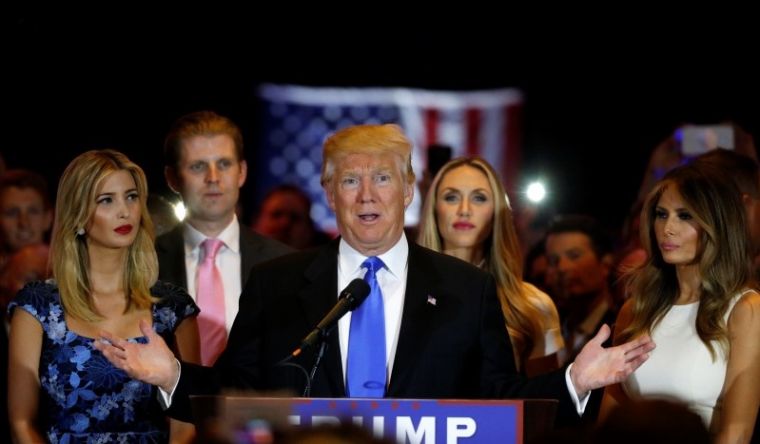Trump certain to win Republican nomination after rival Kasich quits
Donald Trump is certain to become the Republican nomination for US President after his sole remaining rival, John Kasich, quit.
The New York billionaire now faces the challenge of uniting deep divides in the party and has promised to chose a vice president candidate with political experience. He was the assumed nominee after he won the Indiana primary on Tuesday, forcing closest rival Ted Cruz to abandon his bid.
However it was not until the Ohio governor Kasich quit his campaign that Trump was set to win the nomination, to the horror of many within the Republican establishment.

Trump told NBC News he would work with the Republican National Committee to raise about $1 billion for the general election campaign.
Kasich, the Ohio governor, had stayed in the race in hopes of persuading Republicans to choose him as the nominee at a contested convention in July. He ended his campaign as a clear path emerged for Trump to amass the delegates needed to secure the nomination outright.
"As I suspend my campaign today, I have renewed faith, deeper faith that the Lord will show me the way forward and fulfil the purpose of my life," Kasich said in Columbus, the Ohio state capital.
Some Republican leaders said they would support Trump since he would be the nominee, stressing the importance of defeating Clinton in the general election. But there was no mad rush to support him as is typically the case when a presumptive nominee is crowned.
Former President George W. Bush, whose brother Jeb was defeated by Trump in the primary campaign, made clear he was staying out of the race. "President Bush does not plan to participate in or comment on the presidential campaign," said his spokesman, Freddy Ford.
However John McCain, the 2008 Republican nominee, said he would support Trump. McCain is a senator from Arizona who is seeking re-election this year and was insulted by Trump last year.
"As John McCain has said, he will support the nominee of the Republican Party, who is now presumptively Donald Trump," said McCain's Senate campaign spokeswoman, Lorna Romero.
But the wounds from a brutal primary battle were still raw among many Republican loyalists who simply cannot bear to support Trump because they worry he could spell disaster for the party in November.
Republican Senator Ben Sasse of Nebraska reiterated statements that he would not back Trump and pointed to a February Facebook post in which he said he would look for an alternative candidate if Trump became the nominee.
Nebraska's other senator, Republican Deb Fischer, made clear in an interview with Nebraska Radio Network that she would support the party's nominee but was not comfortable with Trump.
"Mr. Trump is going to have to work hard to bring the party together," she said.
South Carolina's Republican governor, Nikki Haley, issued a statement saying she would support the Republican nominee but was "not interested" in being the party's vice presidential running mate.
But Oklahoma Republican Governor Mary Fallin endorsed Trump enthusiastically and welcomed talk of her as his possible No. 2.
Since launching his White House bid last summer as a long shot amid a crowded field that included governors, former governors and senators, Trump repeatedly defied predictions that his campaign would implode.
He prevailed over rivals he derided as "grown politicians," despite making provocative statements along the way that drew sometimes furious criticism from many in the party but fed his anti-establishment appeal.
In a series of television interviews on Wednesday, Trump made clear he would not be looking to placate everyone after a tumultuous primary campaign in which many establishment Republicans rallied around "Stop Trump" and "Never Trump" movements.
Party loyalists have been appalled by the bombastic, bullying style of the former reality-television star, his denigrating comments about women and his proposals to build a wall on the border with Mexico and deport 11 million illegal immigrants.
"I am confident that I can unite much of it, some of it I don't want," Trump said on NBC's "Today" show. "Honestly, there are some people I really don't want. People will be voting for me. They're not voting for the party."
The New York Times quoted Trump as saying he would soon form a team to help him in the search for a vice presidential nominee to be announced in July. He put retired neurosurgeon Ben Carson on the committee. Carson, who like Trump has never held elective office or served in government, endorsed Trump after pulling out of the Republican presidential race earlier this year.
Support for Trump among Republicans jumped nationally in recent weeks to the highest level of the primary campaign, according to Reuters/Ipsos polling. A recent poll found Trump with the support of 53 percent of Republican participants, well above Cruz at 25 percent.
In a potential general election contest, Clinton led Trump by about 10 percentage points among likely voters. The poll included 623 Democrats and 556 Republicans and had a credibility interval of 5 percentage points.
Clinton called Trump a "loose cannon" on Wednesday and said America should not take a risk on an unreliable candidate.
Additional reporting from Reuters.











